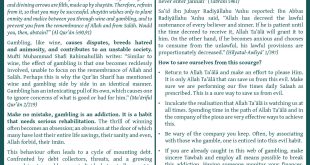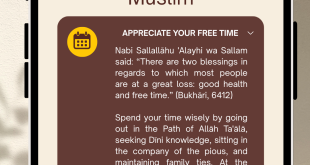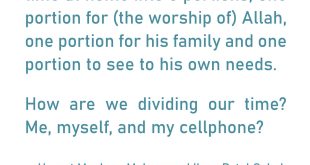We note with disgust the plan by the Department of Education to make gender redundant in schools. Under a recent proposal, the following changes, amongst others, have been suggested:
• Schools will need to provide gender-neutral toilets and changing rooms.
• Gender-neutral uniforms will be introduced.
• Boys and girls will no longer be gender-segregated in classes, lines and groups.
These changes directly contradict the teachings of Islam. Rather, they go against basic modesty and human decency and add further danger to the Īmān and Akhlāq of the next generation.
Gender: A part of human creation
From the creation of Ādam ‘Alayhis Salām, Allāh Ta’ālā taught us the concept of gender and its related separation.
Describing the creation of Man, Allāh Ta’ālā mentions in the Qur’ān Karīm:
“Was he (Man) not an emitted drop of impure fluid? Then he became a clot of blood, then He created (him) and made (him) perfect. And He made from him TWO kinds (genders), MALE and FEMALE.”
(al-Qiyāmah 37, 38, 39)
By seeking to abandon this classification and appease the LGBT lobby, this proposal defies the very nature of humankind.
Transgenderism in Islam
Islām does not recognize the concept of ‘transgenderism’. A sex change or hormone therapy can never change the gender determined by Allāh Ta’ālā. These changes fall under the purview of the verse of the Qur’ān, in which Shaytān promised to mislead humanity by causing them to ‘change the creation of Allāh Ta’ālā’.
Segregation between males and females
Free-mixing of men and women was frowned upon from the inception of Man. The Qur’ān Karīm highlights the incident of the arrival of Sayyidunā Mūsā ‘Alayhis Salām in Madyan, where he noticed two females standing aside, waiting for their turn to give water to their animals. Instead of intermingling with the men, they would wait for them to clear the path before leading their animals to drink. Even before the revelation of the verses obligating Hijāb, concealing themselves from men was a trait found in the honourable women of Arabia.
A narration in Jāmi’ Tirmidhī explains how the mother of the believers, Sayyidah Zainub bint Jahsh Radhiyallāhu ‘Anhā sat in her home in the presence of some visitors. The narration says: “and she sat with her face turned towards the wall”. [Tirmidhi, 3218]
By removing this segregation from such a young age, the next generation will likely grow up without recognizing these important boundaries.
Differences in the dressing of males and females
Nabi Sallallāhu ‘Alayhi wa Sallam said: “May the curse of Allāh Ta’ālā be upon those males who imitate females and those females who imitate males”. (Bukhāri, 1422)
Islām categorically demands that males and females dress differently. Cross-dressing is alien to Islām, and the introduction of gender-neutral uniforms will further obscure the differences in dressing between males and females.
Gender-neutral toilets
The plan for schools to have gender-neutral toilets is full of danger. Moreover, it is a recipe for a future generation of individuals with an identity crisis.
We can never underestimate the need for privacy when using the toilet. Men and women have different hygienic needs. Women experience menstruation, childbirth and menopause. Each of these realities comes with an added need for privacy and comfort.
With the high incidence of rape and abuse in South Africa, it is indeed strange that such a proposal is even being tabled. These gender-neutral toilets are potential ‘havens’ for rapists, paedophiles and others with ulterior motives. Will anyone feel safe exposing their innocent child to these hazards?
What should we do?
• Oppose this dangerous proposal in every possible way.
• Avoid sending our children to institutes that promote such indecency.
• Men should ensure that they do not dress like females, and females should ensure that they do not dress like males. Parents should teach their children these values from birth.
• Ensure complete Shar’i pardah and segregation in our homes and on special occasions. It is highly hypocritical to lament the lack of segregation in schools when our homes and events lack the same.
• Make Duā to Allāh Ta’ālā that He protects us and our progenies from the Fitnahs to come as we approach Qiyāmah.
May Allah Ta’āla protect us from this vile proposal and cause it to never come to fruition. Āmīn
 Wifāq ul Ulāma (SA) ASSOCIATION OF SOUTH AFRICAN 'ULAMA
Wifāq ul Ulāma (SA) ASSOCIATION OF SOUTH AFRICAN 'ULAMA



